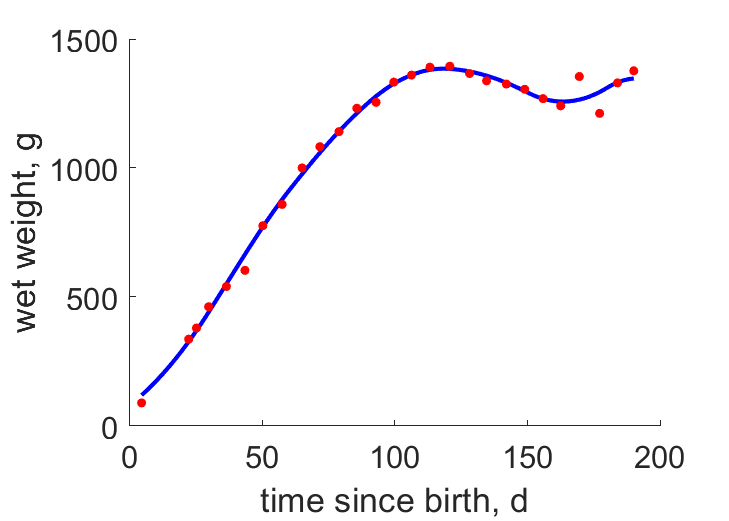Predictions & Data for this entry
| Model: std | climate: MA | migrate: Ms | phylum: |
| COMPLETE = 2.5 | ecozone: MA, MPE | food: biCvf, biCic | class: |
| MRE = 0.005 | habitat: 0xTf, 0iMi, xiFl, xiFp | gender: Dg | order: |
| SMSE = 0.000 | embryo: Tnpf | reprod: O | family: |
Zero-variate data
| Data | Observed | Predicted | (RE) | Unit | Description | Reference |
|---|---|---|---|---|---|---|
| ab | 56 | 56.26 | (0.004605) | d | age at birth | AnAge |
| tx | 27 | 27.02 | (0.0006648) | d | time since birth at fledging | ToboOsor2006 |
| tp | 81 | 80.96 | (0.0004351) | d | time since birth at puberty | guess |
| tR | 1826 | 1826 | ( 0) | d | time since birth at 1st brood | AnAge |
| am | 1.241e+04 | 1.24e+04 | (0.00103) | d | life span | AnAge |
| Wwb | 80 | 79.79 | (0.002624) | g | wet weight at birth | ToboOsor2006 |
| Wwi | 1350 | 1351 | (0.000987) | g | ultimate wet weight | ToboOsor2006 |
| Ri | 0.00274 | 0.002737 | (0.001135) | #/d | maximum reprod rate | AnAge |
Uni- and bivariate data
| Data | Figure | Independent variable | Dependent variable | (RE) | Reference |
|---|---|---|---|---|---|
| tW |  | time since birth | wet weight | (0.01927) | ToboOsor2006 |
Pseudo-data at Tref = 20°C
| Data | Generalised animal | Fregata magnificens | Unit | Description |
|---|---|---|---|---|
| v | 0.02 | 0.02277 | cm/d | energy conductance |
| p_M | 18 | 325.5 | J/d.cm^3 | vol-spec som maint |
| k_J | 0.002 | 0.01334 | 1/d | maturity maint rate coefficient |
| k | 0.3 | 0.3001 | - | maintenance ratio |
| kap | 0.8 | 0.9885 | - | allocation fraction to soma |
| kap_G | 0.8 | 0.8 | - | growth efficiency |
| kap_R | 0.95 | 0.95 | - | reproduction efficiency |
Discussion
- Body temperature is guessed
- mod_1: Pseudo-data point k is used, rather than k_J; Data set tp and parameter t_R are added, the latter replacing clutch interval t_N. Postnatal T is based on PrinPres1991, see get_T_Aves. See further the revision page, theme puberty; varying food
Facts
- Males tend to be slightly smaller than females (Ref: ToboOsor2006)
Bibliography